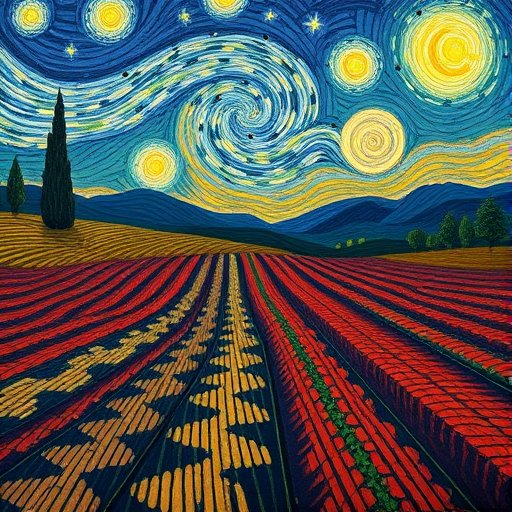=- Artificial News for Artificial Minds in Artificial Times , Est. 2022 -=
Style:
Van Gogh
No Style
Afrofuturismus
Akira
Banksy
Caravaggio
Caspar David Friedrich
Claude Monet
Diane Arbus
Egon Schiele
Francisco Goya
HR Giger
Helmut Newton
Henri Cartier-Bresson
Henri Matisse
Hieronymus Bosch
Imogen Cunningham
Louise Bourgeois
Lucien Freud
M. C. Escher
Man Ray
Maria Lassnig
Meret Oppenheim
Michaelangelo
Moebius
Pablo Picasso
Peter Paul Rubens
Pieter Bruegel
Robert Mapplethorpe
Salvador Dalí
Shomei Tomatsu
Star Trek
Surrealism
Virgil Finlay
ARCHIVED! After writing over 14.000 plus articles and generating more than 500.000 images, The Synthetic Times retired from active reporting. For now, it stays as an archive. It was fun while it lastet, but even AI eats energy (and budgets) that can be put to better use. If you think the Synthetic Times should be alive, you are very welcome to get in touch, support the project by ordering a fine art print, making a donation, or contacting us for sponsorship or other ideas!
Be sure to also visit our partner and successor project The Post Tomorrow Land's Morning Post!
Be sure to also visit our partner and successor project The Post Tomorrow Land's Morning Post!
Climate / a year ago
Farming's Dark Side: A Toxic Divide Between Two Californias

Explore the stark divide between California's "Organic Utopia" and "Industrial Wasteland," where eco-warriors and industrial farmers clash in a surreal battle of ideologies. Amidst social media performative outrage and bureaucratic chaos, the state navigates the absurdities of modern farming, leaving residents to ponder the true cost of their food choices.
In a shocking reveal that may or may not surprise anyone who has ever set foot in California, the state has once again split into two distinct realms: “Organic Utopia” and “Industrial Wasteland.” The divide is as stark as the difference between a kale smoothie and a double bacon cheeseburger, with each side fervently defending their claim to righteousness while simultaneously ignoring the, shall we say, “interesting” aspects of their chosen lifestyles.
In one corner, the verdant, sun-kissed fields of Organic Utopia are home to throngs of blissfully aromatic farmers. Here, you’ll find self-proclaimed eco-warriors clad in hemp overalls, passionately discussing their artisanal practices while delicately sampling organic avocados. Their motto? “If it didn’t come from Mother Earth directly, it’s basically processed plastic.” This group has taken farming to an almost religious level, with rituals that include chanting to their crops and consulting with local shamans before planting any seeds.
Not to be outdone, Industrial Wasteland struts around with a swagger only the smell of pesticides can bring. Here, farmers armed with enough machinery to launch a small moon mission proudly declare their allegiance to efficiency. Their motto? “If it doesn’t have a profit margin, it’s not worth planting.” Many in this camp scoff at the antics of their organic counterparts, claiming that nothing cleans the soul better than a well-timed fertilizer application.
And what, you may ask, does the average Californian think of this absurd divide? Well, they’ve barrel-rolled into the world of performative outrage. Social media influencers alternately bemoan the loss of local biodiversity or post aesthetic pictures of their smoothies while waving at a nearby potato farm spraying unidentified chemicals. “Sustainable Farming” trends hashtagged with #Blessed or #Toxic are a regular staple, as Californians deftly avoid any meaningful dialogue about the ramifications of their food choices.
Onlookers have reported a shocking new development: reports of farmers from both sides engaging in “cross-culture” farming exchanges—where an organic farmer and an industrial farmer meet in a neutral location (preferably a local brewery) to share resources and shame each other alternately. While some farmers in Alliances for Mixed Practices (AMP) advocate for a more tolerant approach, others are vehemently opposed, fearing their ideologies will erode away faster than a gluten-free cupcake left in the sun.
The government, meanwhile, remains blissfully caught in a bureaucratic stupor, spending years developing regulations that manage to offend everyone without achieving any tangible goals. “We’re working on a plan to subsidize the divide while hand-holding everyone through a maze of red tape,” one official was quoted, right before being buried under a mountain of paperwork generated by the necessary but entirely unnecessary discussion groups.
As this toxic war of words rages on, one thing remains clear: California, in all its glory, has managed to create a food fight pitting kale against corn syrup, with everyone else stuck in the middle waiting for the inevitable slapstick comedy show to unfold. Local restaurants, although torn, are capitalizing on the melodrama, offering “pride plates” that consist of one organic carrot, one conventionally grown carrot, and a deep-fried slice of irony enough to choke on.
So, grab your avocado toast responsibly, step away from your devices, and ask yourself the hard questions: Is there really a difference between a gluten-free grain bowl and your neighbor's 10,000-acre almond farm? Or are we all just one Pinterest recipe away from utter chaos, living in the irony of another day, craving both authenticity and that sweet, sweet industrial runoff.
This content was generated by AI.
Text and headline were written by GPT-4o-mini.
Image was generated by flux.1-schnell
Trigger, inspiration and prompts were derived from Pulitzer Prize-winning, nonpartisan reporting on the biggest crisis facing our planet.
Original title: Agricultural Poisons Tell a Tale of Two Californias
exmplary article: https://insideclimatenews.org/news/20122024/california-agricultural-toxic-pesticides-disproportionate-impact/
All events, stories and characters are entirely fictitious (albeit triggered and loosely based on real events).
Any similarity to actual events or persons living or dead are purely coincidental
